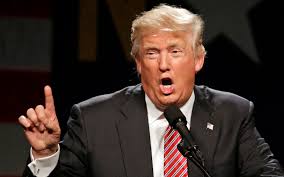- Comparing the low-level insult comic Donald Trump to Don Rickles, as some have, is like saying an insane person who severed his tongue with a piece of broken glass is just like Harpo Marx.
- I’m not a psychiatrist, so I can’t definitively say that Donald Trump is deeply mentally ill, but perhaps we can agree that he exhibits many of the behaviors of mentally ill people who’ve gone untreated, and if any of our friends or relatives acted like him, we would seek professional help for them.
- Trump’s Simon Cowell-Mussolini mash-up may not strictly speaking play out as Fascism in the context of our laws and Constitution despite all his sound and the fury in that direction, but even without the support of his party, wouldn’t he as President be able to plunge us into an place as dark an any we’ve experienced since the internment of Japanese-Americans during WWII?
Excerpts from two pieces follow: 1) David Remnick’s sharp analysis of the GOP nominee’s predictably disgusting response to the horrific Orlando massacre, and 2) T.A. Frank’s Vanity Fair “Hive” argument that the nightmarish realization of Trump winning the White House won’t result in full-on Fascism despite whatever damage will result.
From Remnick:
With every month, it has become clearer that Trump is a makeshift politician, whose rancid wit resides in his willingness to say whatever it takes to arouse the fears of a political base. He might have started his campaign with the idea of winning some votes and publicity, increasing his profile as a marketing whiz, and then dropping out. Good for business! But now that he has stunned the political world—and, likely, himself—he has shown little inclination (or, perhaps, capacity) to grow into his role, to modify his language, be it for the sake of the Republican establishment or of simple decency. He’ll have none of that. Whatever inflates his sense of self and prods the anxieties of the country—that’s what works for him.
It feels indecent on such a day to engage these comments of Trump’s at all. But their velocity, vapidity, and sheer ugliness reflect his character, his emptiness, and, most of all, the shape of the election campaign to come. Since Trump has ascended, it’s been clear that his demagogic instincts could be tested precisely by the sort of tragedy suffered in Orlando. And, when faced with the path of modesty and the path of dark opportunism, he has chosen the latter. That’s what he is about. It’s who he is.•
From Frank:
Luckily, when it comes to true dictatorship, Trump lacks many of the most ominous traits.
For all of his incendiary rhetoric, there’s limited evidence of any belief in racial superiority or hatred of other races. Suggesting that Mexican immigrants and rape go hand in hand may be heinous, but it is not the same thing as white supremacy, and Trump is less right-leaning on many matters of race than some traditional Republicans. Regarding affirmative action, a policy that many conservatives are working to eliminate, Trump has said, “I’m fine with it,” merely laying out that one day “there will be a time when you don’t need it.” As careless as Trump has been about distinguishing the vast majority of peaceful illegal immigrants from the small minority who commit crimes, and as sinister as a “deportation force” sounds, the candidate has mostly confined his demonizations to the powerful: politicians, high-ranking officials, the media, foreign governments.
The worst tyrants of the past century or two also presided over a lot of soldiers or paramilitary forces before they came to power. Benito Mussolini had hundreds of thousands of Black Shirts, and Hitler had hundreds of thousands of Brown Shirts. Vladimir Lenin, Mao Zedong, Pol Pot, Fidel Castro, and Robert Mugabe all headed large guerrilla forces. Many dictators came from the military, like Idi Amin, Muammar Qaddafi, and Juan Peron. Trump just went to military school.
Finally, and perhaps most important, Trump is entering politics too late to become a proper tyrant. The dictators of the past two centuries have had a commitment to political agitation from a young age: Saddam Hussein was a passionate Baathist in his 20s. Stalin was a revolutionary from the moment he was expelled from school. (Dictators who have come late to politics have cropped up in South America, with figures like Jorge Videla in Argentina and Augusto Pinochet in Chile, but they were senior military officials in countries with histories of military coups.) The quality that made these tyrants so brutal was not primarily thin-skinnedness or impulsivity but fanaticism. Trump is getting into politics late in life after a successful career doing other things. He’s volatile and impulsive, but he’s not fanatical.
In a best-case scenario, Trump would be less dangerous to civil liberties and democratic norms than someone like Marco Rubio, because his own party is willing to break ranks with him.•
Tags: David Remnick, Donald Trump, T.A. Frank

